Over a year previously, a women claiming to be Craig Morson's great-grandmother ("Mother Quigley") showed up at his home, and was allowed to live with him and his wife Joanna.
Mother Quigley has made quite a nuisance of herself and Morson decided to do some investigation into her origins. So he is quite surprised to learn from a gravestone-maker that his real great-grandmother had died and was buried shortly before the arrival of the old woman now living with them. Now knowing that she is an impostor, he decided to thoroughly observe and note her actions and habits to gain some clue to her real identity. He recalls that she has an uncanny fear of the ocean, and insists on having all the window shutters closed at night. While watching her sitting on a chair on the beach from a cliff above, he looks away for a moment and then looks back to notice her sudden absence. When he returns to the house, Joanna explains to a baffled Morson that Mother Quigley had never left the house that afternoon.
That evening, Mother Quigley is sitting, eagerly awaiting the time — to come in nine days — when she will be able to take over the young, pretty body of Joanna. But first she'll need to administer to Joanna a special herb, which for months she had been urging Joanna to take, ostensibly for medicinal purposes. While she is pondering all this, she realizes that she can hear the roar of the ocean — one of the windows was open. She yelps an uncontrollable shout of terror, and Joanna comes and closes it, complaining to her husband that he should have remembered to shut all the windows. He apologizes, but Mother Quigley begins to suspect that he knows of her false identity.
The next day, as Joanna goes for her nap Morson confronts Mother Quigley and tells her that he is well aware that she is an impostor. She confesses, but explains that she was friends with his great-grandmother; that when she died she took on her role to support herself by living with him under the pretext of being his elderly ancestor, that she would have no other way of staying alive, being just a poor helpless old woman. Content that he still knows nothing of her true nature, she retires to her room while Morson leaves for the law firm where he works. She hears the front door shut, and goes into Joanna's room to give her the herb while she sleeps. However, Morson didn't leave; he was on the verge of doing so when he thought that Joanna should know the truth about Mother Quigley before he left. As he enters his wife's room, he catches her administering the herb. He startles her and she drops the herbs she was trying to sprinkle into Joanna's mouth; he overpowers her easily, but an unexpected thing happens; the room fills with multiple images of Mother Quigley, each of which is trying to either hide or escape the room. In his astonishment, he drops her and the images disappear. Joanna awakens to see her husband seemingly terrorizing the helpless old woman. Mother Quigley defends herself, saying that it was just that powder she had been trying to get Joanna to take for months to help with her headaches. Knowing he can't prove anything, much less convince Joanna of the images of the old woman he saw, he lets the matter go for the moment, but he takes the powder and has a professor friend at the law firm analyze it for him.
A couple of days later, the friend reports that it is a ground-up species of seaweed that is commonly associated with sea witches. He does some research and learns that these sorts of witches take possession of young women during a special moon phase comes around at midnight, just a few days away. To confirm his suspicions, he arranges to have Joanna away from home for a couple of days (and hires a young girl to look after Mother Quigley), during which he goes to the village where his real great-grandmother was buried. He digs up the coffin and it is empty; he deduces that one of the witch's images must have been buried, not a real person.
He returns home and informs the girl that he is going to have a nap before he goes to pick up his wife. However, he in fact goes out to his car and fetches a large container of gasoline into the house, intending to burn down the house with Mother Quigley inside. He then lies down, waiting for the right time. Suddenly, his wife enters the room, having been driven home by the people she was staying with. With midnight just an hour away, he has to rethink all his plans. He urges with his wife to go to a hotel, and explains who Mother Quigley really is; Joanna, however, thinks he has been over-stressed and is imagining things. He then intends to instead throw the old witch over the cliff and into the sea which her kind fear so greatly. Joanna refuses to leave. He continues with his plan regardless, and has to break into Mother Quigley's room because the witch had locked the door. Once in, he is confronted by twelve identical forms of the old woman. Knowing all but one are false images, he gets ready to carry them, one by one, up the cliff and into the sea. Joanna, now convinced of the truth, sees a better way to solve the problem. She goes into the room to open the windows, but is immediately tackled by the old women. Morson saves her in time, and together they open all the windows to the night sea outside. The old women shiver in terror as a foggy entity enters the room and finally, after centuries of searching for the last of the sea witches, picks her up and drops her from a height. All the images disappear, and just the crumpled corpse of the old woman remains.
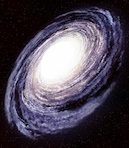
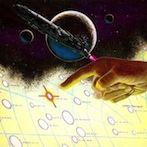
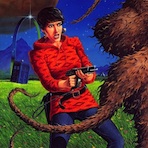

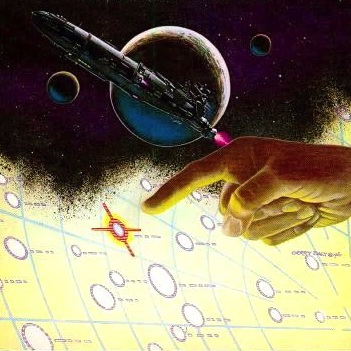
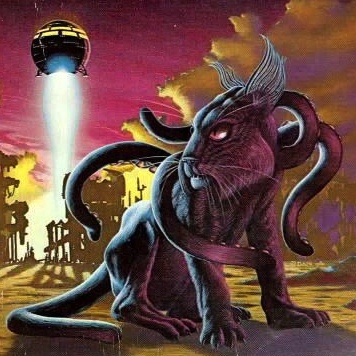
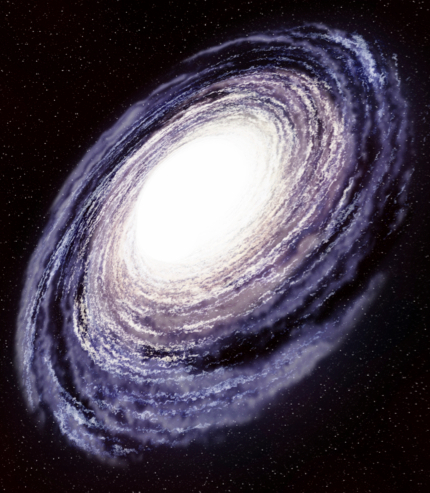

"The Witch" is one of a handful of fantasy stories by van Vogt; by his own admission, he found fantasy particularly difficult to write, and always found the genre "weird." Indeed, he even attributed the demise of Unknown Worlds to his inability to write enough fantasy tales to satisfy John W. Campbell, Jr.!
This story — incidentally, inspired by a suggestion of Campbell's — was loosely adapted by Alvin Sapinsley as the episode of Night Gallery entitled "Since Aunt Ada Came to Stay," aired on September 19th, 1971.